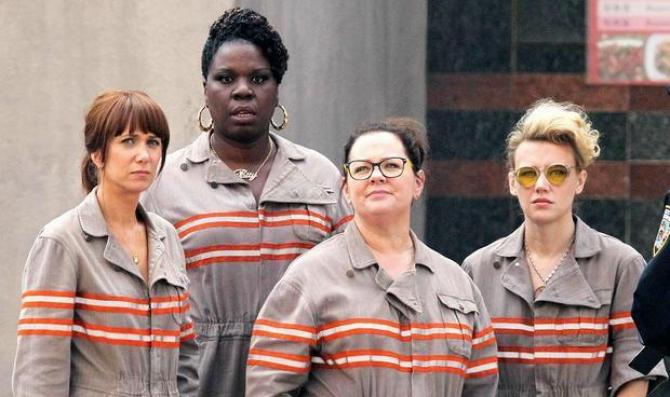[ad_1]

Kristen Wiig, Leslie Jones, Melissa McCarthy and Kate McKinnon in Ghostbusters movie poster
Columbia Pictures
Editor’s note: This article contains tweets that some may find offensive.
In the Ghostbusters reboot, Saturday Night Live’s Leslie Jones plays a street-savvy transit worker in New York City who joins a merry band of scientists played by Kristen Wiig, Melissa McCarthy and Kate McKinnon.
Notable for both its nostalgia and its all-female ensemble cast, the film has sparked controversy because Jones is the only ghostbuster who isn’t a scientist.
Faux controversy, right? Well, not to those who are concerned that, once again, the black female character is positioned as the loud, sassy sidekick to white women.
As previously reported by The Root, Jones responded to the outrage by pointing out its classist slant:
I’m playing a hardworking woman.The regular one that rep the people. You guys are the racists by labeling her a lowly MTA worker.Not me
— Leslie Jones (@Lesdoggg) March 7, 2016
Regular People save the world everyday so if I’m the sterotype!! Then so be it!! We walk among Heroes and take them for granted.
— Leslie Jones (@Lesdoggg) March 4, 2016
@IWriteILove if they made me a scientist you would be mad at what type of scientist. Seriously it’s a fucking movie get over yourself
— Leslie Jones (@Lesdoggg) March 3, 2016
For some critics, though, the issue has nothing to do with being a “regular” transit worker but, rather, with the generic stereotypes that primarily define roles for black women in Hollywood—stereotypes that Jones has built a career on to make white people laugh.
The Root’s Senior Writer Kirsten West Savali joined Forbes’ political contributor Rick Ungar and former Republican National Committee Chairman Michael Steele on Sirius XM’s Steele & Ungar show to discuss the Ghostbusters controversy, stereotypes and diversity in Tinseltown, as well as the respectability politics and racism that shade it all.
“Jones stands at the intersection of discrimination, exploitation and isolation,” West Savali said. “Jobs for black comediennes are limited, for black women in general, and she’s fulfilling that loud, angry, aggressive stereotype that white Hollywood seems to be most comfortable experiencing, while exhibiting an inability to take into consideration how some black people are receiving her.
“But what also has to remain omnipresent is that there are limited roles that Hollywood expects black women to fill or else they don’t have access—and that’s arguably the most problematic part of it all,” she continued. “So I think it’s critical that we remain empathetic to that, because as black people, we have experienced that marginalization in many spheres.”
Listen to the entire segment below:
[ad_2]





















